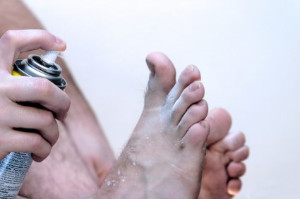
Dr. Kenneth Rosenthal
Dr. Jonathan C. O’Quinn
Dr. Michael J. Price

Dr. Kenneth Rosenthal
Dr. Jonathan C. O’Quinn
Dr. Michael J. Price
 Athlete’s foot is a common fungal infection. A majority of athlete’s foot cases are caused by fungi that thrive in closed, warm, and moist environments. The fungi feed on Keratin, which is a protein found in the hair, nails, and skin. Athlete’s foot is mildly contagious and can spread through direct contact with the infection and by skin particles left on towels, shoes, or floors. Walking barefoot can increase the chances of contracting athlete’s foot. The risk can also go up depending on your susceptibility. People who have impaired immune systems or diabetes are at greater risk for infection if they have an open cut or sore on their foot. If you have developed athlete’s foot or feel that you may be at risk, it is advised that you consult with a podiatrist.
Athlete’s foot is a common fungal infection. A majority of athlete’s foot cases are caused by fungi that thrive in closed, warm, and moist environments. The fungi feed on Keratin, which is a protein found in the hair, nails, and skin. Athlete’s foot is mildly contagious and can spread through direct contact with the infection and by skin particles left on towels, shoes, or floors. Walking barefoot can increase the chances of contracting athlete’s foot. The risk can also go up depending on your susceptibility. People who have impaired immune systems or diabetes are at greater risk for infection if they have an open cut or sore on their foot. If you have developed athlete’s foot or feel that you may be at risk, it is advised that you consult with a podiatrist.
Athlete’s Foot
Athlete’s foot is often an uncomfortable condition to experience. Thankfully, podiatrists specialize in treating athlete’s foot and offer the best treatment options. If you have any questions about athlete’s foot, consult with one of our podiatrists from Eastern Carolina Foot & Ankle Specialists. Our doctors will assess your condition and provide you with quality treatment.
What Is Athlete’s Foot?
Tinea pedis, more commonly known as athlete’s foot, is a non-serious and common fungal infection of the foot. Athlete’s foot is contagious and can be contracted by touching someone who has it or infected surfaces. The most common places contaminated by it are public showers, locker rooms, and swimming pools. Once contracted, it grows on feet that are left inside moist, dark, and warm shoes and socks.
Prevention
The most effective ways to prevent athlete’s foot include:
Symptoms
Athlete’s foot initially occurs as a rash between the toes. However, if left undiagnosed, it can spread to the sides and bottom of the feet, toenails, and if touched by hand, the hands themselves. Symptoms include:
Diagnosis and Treatment
Diagnosis is quick and easy. Skin samples will be taken and either viewed under a microscope or sent to a lab for testing. Sometimes, a podiatrist can diagnose it based on simply looking at it. Once confirmed, treatment options include oral and topical antifungal medications.
If you have any questions, please feel free to contact our office located in Greenville, NC . We offer the newest diagnostic and treatment technologies for all your foot care needs.